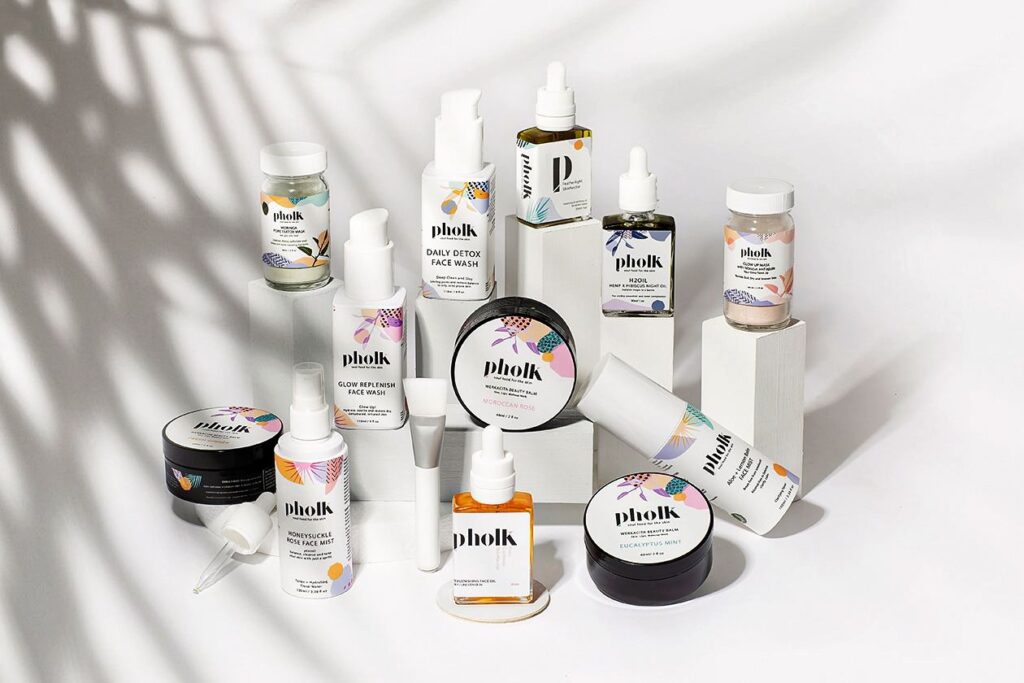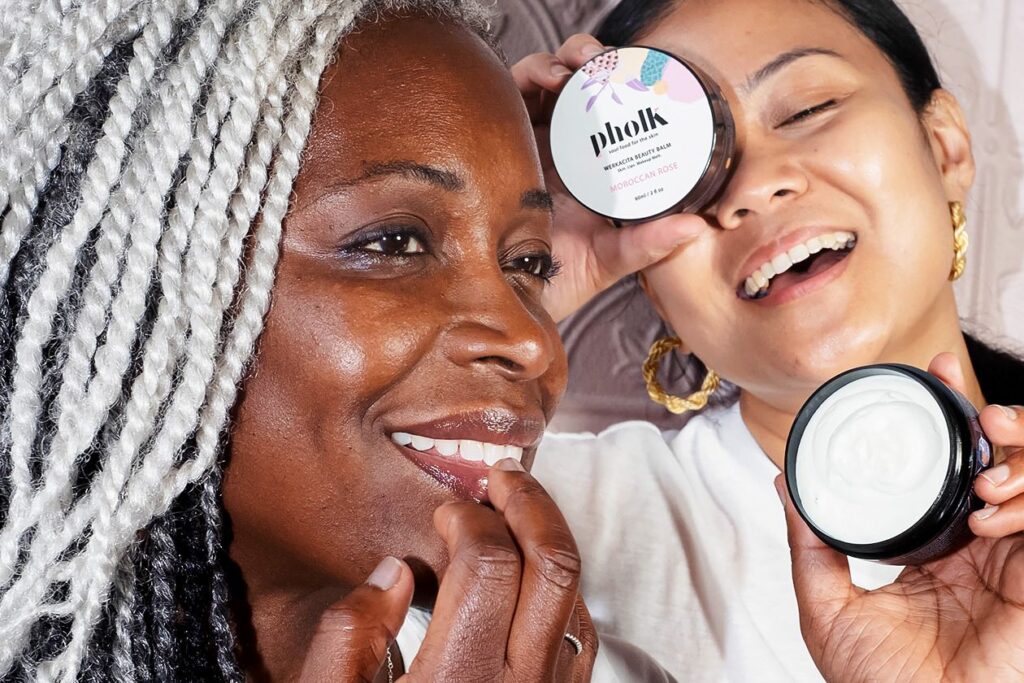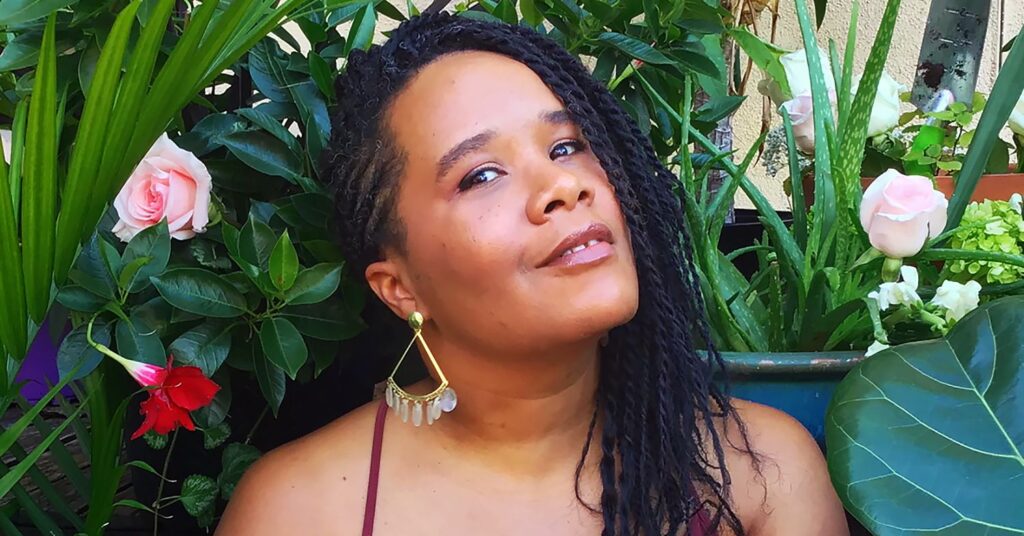On the surface, the global beauty industry seems like a booming success. And the numbers support that assumption: it’s worth more than $530 billion USD. But when you look past the dollar signs to the products, it becomes clear that all of that beauty money has been hiding something quite ugly: a business that has thrived on underrepresenting its biggest consumer base, Black women. So Kentucky-raised academic Niambi Cacchioli decided to take a stand. But not through words on a page. She created Pholk Beauty, a skincare brand that offers organic, natural, vegan products, made specifically for people of color.
With barely any representation, Black folks have had to mix and match to create a blend of products that works for them, says Cacchiolo. As a result, they spend nine times more on beauty products than non-Black consumers. The founder herself pivoted from African diaspora historian to beauty entrepreneur after a particularly disillusioning experience in a New Jersey organic skincare store. “Products were geared towards white women, the ideal, clean beauty customer,” she recalls.
Coming from a family of gardeners who often turned to home-grown remedies for skin concerns, Cacchiolo wasn’t out of her depth in the beauty world. She combined her love of plants with her academic knowledge of African folk remedies, and created a brand that now has partnerships with Goop, Credo, and Thirteen Lune. But Cacchioli’s overall goal is bigger than any single business deal.
Cacchiolo wants to go further than product availability for people of color, and inspire a restructuring of the beauty industry, giving Black farmers—who grow many of the ingredients used in cosmetics—a meaningful and profitable role in the market. And in doing so, she aspires to create a future where growers and suppliers support each other to shape a sustainable, farm-led industry. Read on to find out more about Cacchiolo’s journey from gardener to entrepreneur, as well as her vision for a beauty industry that works for all, from, quite literally, the ground up.

Pholk Beauty: Pioneering a farm-led, inclusive, sustainable future of skincare
LIVEKINDLY: To create products like Pholk’s moringa-infused Teatox Mask and rose geranium Glow Replenish Face Wash, you have to really understand how plants heal the skin. Can you talk about when that education started for you?
Niambi Cacchioli: Growing up in Kentucky, I was surrounded by people who didn’t have a lot of money, but they always had gardens and vegetable plots. It was one of the easiest ways to live. So for me I’ve always thought about using natural ingredients to take care of my inside and my out. The folk around me used a mix of drugstore skincare with ingredients from the pantry and the garden. My mother always used aloe stalks to soothe our burns and mosquito bites. For me, that was the norm. Beauty is like cooking.
LIVEKINDLY: You travelled a lot in your work as an academic before settling in New Jersey. Can you talk about why you knew it was time to take this knowledge of plants and create a beauty brand when you got back to the U.S?
Cacchioli: I had moved back after living in Paris, I was pregnant, and I had just taken a teaching job. With the change in climate, stress, and hormones, I was suffering with acne, dehydration, dark marks, facial hair, all of it. My first impulse was to go to organic and clean beauty stores like in Paris, but in the New Jersey area, nothing was made for me. When I looked at the shelves, though, I saw aloe, hibiscus, moringa, mango, frankincense, and so on—ingredients cultivated and harvested with brown hands. But there was no thought to how those ingredients would work for melanin-rich skin. It was literally a white space.
LIVEKINDLY: Pholk’s products do just that, changing the game for many by catering to skin concerns like larger pores and hyperpigmentation. What gave you the strength to overhaul your life and career and build the brand?
Cacchioli: I was raised by my grandmother and my mom, who lived during segregation. Their way is that if you’re not being served in your little corner of the world, you have a choice: you can either affect change or you can live with it. I felt that, instead of shaming the beauty industry and shaming the Black and brown women about what they’re using on their skin (because who has time to research?), I could really weave together my heritage and my family culture with my history expertise, my travel expertise, and my understanding of storytelling.
LIVEKINDLY: You’ve been successfully involved with incubator schemes, like Tower 28’s Clean Beauty Summer School, and your brand is growing so fast. There’s no way you can grow everything in your garden and keep up! How have you kept your homegrown ethos?
Cacchioli: We work with farm cooperatives in the southern U.S., particularly those that have a mission to work with Black, BIPOC, and women independent farmers, to source our ingredients. Black Soil Kentucky, for example, has a network of small farmers across the state. Working with them is such a win for us. It’s really interesting to see how these cooperatives are borrowing and innovating a model that we’ve seen work in West Africa and in the Caribbean.

So many ingredients in the beauty industry are amazing for the skin, but they’re really labor and water-intensive … brands should start thinking about resilient, adaptable, and versatile plants.
LIVEKINDLY: It’s an empowering business model that helps to level the playing field. Everyone works together. Has that influenced your ingredient selection process too?
Cacchioli: I look at what farmers are already growing, so we can co-create the products. I think that is a huge way forward for the beauty industry in general. There are so many ingredients in the beauty industry that are amazing for the skin, but are really labor and water-intensive. For us, we use an African diaspora sourcing framework, so we’re using plants from high sun climates, and they are already resilient and adaptable. I think beauty brands should start thinking about resilient, adaptable, and versatile plants.
LIVEKINDLY: As a historian, you specialized in the African diaspora. Other than crop resilience, why is that influence so important to you and the brand now?
Cacchioli: When we talk about African diaspora beauty rituals, we tend to talk more about west Africa, South Africa, or the Caribbean. But as someone who grew up with gardeners and farmers in a semi-rural part of the country, it’s really important for me to also fold Black Americans’ green legacy into our Pholk story. I do this through the plants that we use. I love blending ingredients like moringa from Ghana with hemp seed oil from my home state. It’s one of the best ways I’ve found to really talk about and share my own experience, but also the global phenomenon of healing of the African diaspora. I love doing that through our products.
LIVEKINDLY: And everything is totally animal-free. Was that an easy choice to make?
Cacchioli: I was using honey at first, and I found that my vegan customers were studying all of my ingredient lists. And I was like, “They don’t have time for that!” It’s such an easy switch. Inclusivity for me is about ease. It’s about me doing the work.
LIVEKINDLY: Choosing resilient, adaptable, locally-grown, vegan ingredients makes for a sustainable business model. Why is that important to you?
Cacchioli: For me, as a Black southerner, sustainability is my birthright. I grew up with sustainable parents. When you don’t have a lot of means, you have to be sustainable, you have to re-use. So we are very resourceful. We have really streamlined our ingredients list down to the drop; we only use what we need.
LIVEKINDLY: You mentioned cooperatives, but how can the beauty industry take things a step further to ensure a more equal, and sustainable, future?
Cacchioli: I’m hoping that instead of having mega-companies, we have a lot of smaller, medium-sized companies that work directly with farming and supply partners. We work with a moringa brand based between Ghana and Boston, for example. They have an amazing model. They source moringa through a cooperative in Ghana and process it themselves in Boston. They use it on the front end for their skincare collection, but they also sell it wholesale. So my moringa oil supplier is another beauty brand! That kind of cooperative economics gives me chills. It is the future.
Find out more about Pholk Beauty here.


